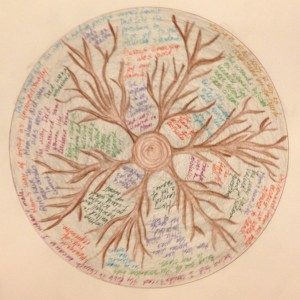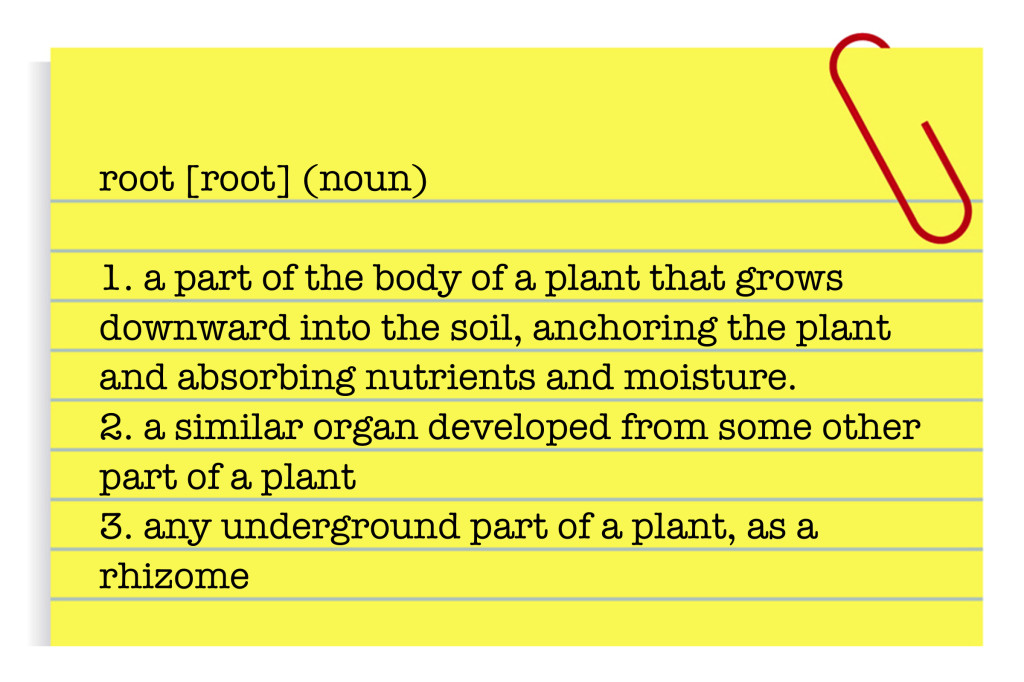Today, the doors open once again for Mandala Discovery: 30 Days of Mandala Journaling. Sign up now and you’ll receive a prompt every day for 30 days during the month of March.
This course is changing people’s lives. Nearly 200 people have been through the course since it opened in September 2013, and I have heard remarkable stories of how it has impacted people in positive ways. (Some of their testimonials are on the sales page.)
In honour of registration opening once again, below is a sample prompt. In case you’re curious, but do not quite understand what the course is all about, this will give you a sense of what you’d receive every day.
Each day is based on a different theme related to personal growth. This sample prompt is based on the them of “roots”.
Where Your Roots Grow
A couple of years ago, I had the privilege of participating in a healing circle for people who’d been impacted by residential schools in our country. This is a tragic chapter of Canada’s history in which Aboriginal children were taken from their families and placed in boarding schools where they were denied their own cultural practices and language, and many were physically and emotionally abused.
A few of the people in the circle had been students at residential schools, but more of them had been raised by parents who were forced to attend residential schools. And then there were those of us who didn’t have residential schools in our blood line, but knew that we were impacted nonetheless, because our community members were impacted and because we were raised as white Canadians with a colonial history. Some of our ancestors undoubtedly shared in the guilt of this injustice.
As we listened to the stories shared around the circle, it was clear that all of us carried both the wounds and the wounding of our ancestors. It was especially apparent in those who’d been raised with parents who’d been in residential schools. Some of them spoke of alcoholism, family abuse, cultural neglect, and other stories that clearly left deep wounds in their collective psyche.
Whatever our roots are – whether we were raised in a lineage of oppressed or oppressors, religious or agnostic, poverty or wealth – we all carry the stories of our ancestors with us.
Our roots reach much deeper into the soil of our family’s past than we ever fully understand. We are impacted by the history that happened in our bloodline long before we were conceived and born into this world.
Bethany Webster talks about the importance of healing the mother wound. “The mother wound is the pain of being a woman passed down through generations of women in patriarchal cultures. And it includes the dysfunctional coping mechanisms that are used to process that pain.” The mother wound manifests itself in our lives as shame, comparison, the feeling that we need to stay small, allowing ourselves to be mistreated by others, and self-sabotage. If we do not heal it, she says, we continue to pass this wound down through the generations.
We must also consider the ways in which patriarchy has men. As Richard Rohr says, “After 20 years of working with men on retreats and rites of passage, in spiritual direction, and even in prison, it has sadly become clear to me how trapped the typical Western male feels. He is trapped inside, with almost no inner universe of deep meaning to heal him or guide him.” Men have to come to terms with their own wounds and often have little support to find healing for them.
These stories that we carry from our past – that we are not worthy, that we need to stay small, that we are not allowed to show emotion, that our cultures don’t have as much value as that of our colonizers, or that we are not allowed to do anything that goes against our religion for fear of hell – they are the soil in which our roots grow. If that soil is not fertile and nurturing, our growth is impaired and we never reach our full potential.
Imagine, though, that through an alchemical process, these stories can be healed and transformed and can become the fertile soil we need for healthy growth. Imagine that they can provide rich fertilizer to feed our roots and make our branches grow and our fruit to be plump and sweet.
We can transform these stories. They do not need to keep us small. They do not need to hold us back from what we can become.
Through much inner work – whether that looks like therapy, journaling, dance, meditation, mandala-making, or any other form of self-discovery and healing – we can cultivate those stories and stir them like a compost heap until they become the richest of fertilizer. This is not easy work, and it is not short-term work, but it is necessary work. The world needs us to heal and the world needs us to grow strong and true.
After reading the article by Bethany Webster, about the need to heal the Mother Wound, I wrote a letter to my mom. She died last year, so she won’t read it on this earth, but I still felt like there were some things I needed to say to her. I acknowledged the way that she had been wounded (by losing her mother when she was six, for example) and forgave her for the way that those wounds were passed on to me. I thanked her for the love she poured on me and my siblings despite the deep wounds she carried. Writing the letter felt significant – like I had begun to heal something for both myself and for her. There is more work to do, but every step toward healing is a step in the right direction.
Consider what Charles Eisenstein says about how our healing can contribute to the world’s healing (in “The More Beautiful World Our Hearts Know is Possible”):
“When I see how my friend R. has, in the face of near-impossible odds, so profoundly healed from being abused as a child, I think, ‘If she can heal, it means that millions like her can too; and her healing smooths the path for them.’
“Sometimes I take it even a step further. One time at a men’s retreat one of the participants showed us burn scars on his penis, the result of cigarette burns administered by a foster parent when he was five years old to punish him. The man was going through a powerful process of release and forgiveness. In a flash, I perceived that his reason for being here on Earth was to receive and heal from this wound, as an act of world-changing service to us all. I said to him, ‘J., if you accomplish nothing else this lifetime but to heal from this, you will have done the world a great service.’ The truth of that was palpable to all present.”
Eisenstein goes on to talk about scientific research into “morphic resonance” in nature – the concept that once something happens somewhere, it induces the same thing to happen elsewhere. Some substances, for example, are reliably liquid for many years until suddenly, around the world, they begin to crystallize. It is not clear why it happens, when these substance are not in contact with each other or exposed to the same environment, but it seems that a change to one begins to result in changes to others. In the same way, he says, the healing of one person can lead to the healing of others, even if those people never meet.
Transforming your stories into rich soil so that you can grow strong is necessary not only for you, but for the world.
Your Roots Mandala
Imagine you are a tree, firmly rooted in the stories of your past. Some of these stories are conscious for you (memories from childhood) and some are less conscious but you are impacted by them nonetheless.
Begin by drawing a large circle. In the centre of the circle, draw a small circle that represents the trunk of a tree. Reaching out from that trunk into the fertile soil around it, draw the roots of that tree. (Imagine you are looking down on the tree from above and can only see that part of the tree that is underground, not the branches or leaves.)
 Between the roots, write down stories that are part of your past. Start with the stories that you know have impacted you and your growth in both positive and negative ways. Your religious upbringing, your father’s temper, your mother’s insecurity, your grandmother’s way of making you feel special, your birth order, your childhood abuse, etc. Do not censor yourself – if a story shows up, there’s a good chance it had an impact on you whether or not you recognize it. (There is no right or wrong way to do this – your stories are your own and you know what matters to you.)
Between the roots, write down stories that are part of your past. Start with the stories that you know have impacted you and your growth in both positive and negative ways. Your religious upbringing, your father’s temper, your mother’s insecurity, your grandmother’s way of making you feel special, your birth order, your childhood abuse, etc. Do not censor yourself – if a story shows up, there’s a good chance it had an impact on you whether or not you recognize it. (There is no right or wrong way to do this – your stories are your own and you know what matters to you.)
Reach further back. What are the stories that impacted your lineage before you were born? Your family’s displacement from the country they called home, your grandmother’s abusive marriage, your ancestors’ connection to colonialism or oppression, your grandfather’s death when your mother was small.
Write them all down. Some of them may bring up pain, and some may bring up positive memories. Some may have a clear impact on your life, and some you may not fully understand until a much later date. They are all part of your narrative and they are all part of the soil in which your roots dig for nourishment.
With a black pencil crayon, shade over the stories you have written, imagining that all of them are now becoming part of the compost that helps you grow. Whether good or bad, those stories are your soil.
Note: This exercise may bring up a lot of mixed emotions for you. It may feel like a little bit of healing, or it may feel like you’ve opened a wound that is still raw. That’s all part of the healing process. Sit with whatever comes up and do not try to suppress it. If you need to, do some further journaling to explore what came up, or find someone you trust that you can talk to about this.
You can find a downloadable pdf of this lesson here.
Did you find this useful? Consider signing up for the March 2014 offering of Mandala Discovery: 30 Days of Mandala Journaling. You’ll get 30 more like this.

